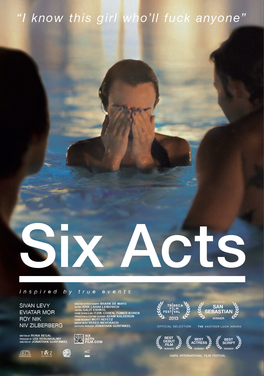
When my roommate at USC, a film student with a pink streak in her hair, edited a documentary on rape, I remember the ambivalence I felt. This issue, I thought, was a closed book: a mandatory assembly on rape and consent, massive turnout for Take Back the Night demonstrations, “yes means yes and no means no, whatever she wears and wherever she goes”…we got it.
Do we get it? Rape laws have been expanded and updated. The 2012 elections saw the condemnation of political candidates who believed in “honest rape.” Duke, Penn State, and Steubenville have forced the discussion of rape culture. There are campaigns for parents to teach their children to respect the rights of others and for men to be “upstanders” rather than “bystanders.” I thought that the idea that rape requires vaginal penetration and physical assault was, like widespread opposition to marriage equality, a relic destined to decline with the Baby Boomers.
And then I got a reality check. I attended a screening and discussion of a new Israeli film, Six Acts, put on by Columbia University’s Institute for Israel and Jewish Studies. About 20 people trickled into the event, taking the free candy and the plastic cups bearing messages about consent.
S#x Acts centers around Gili, a teenager “in the top five of her class,” new to her school, and desperate for acceptance. Omri, a good-looking and wealthy classmate of Gili’s, summons her to a mall parking lot, urging his friend Tomer to hook up with her. Ambivalent, Tomer retreats, Omri sends Gili after him, and after some half-hearted flirting, Gili manually stimulates Tomer to orgasm. When Omri later insists on having sex with Gili in front of Tomer, however, Gili protests. Omri smoothly overrides her objections and initiates anal sex with Gili.
No. Wait. I’m sorry. Omri rapes Gili.
From there, the movie is a downward spiral of abuse. Omri feigns romantic interest in Gili while offering her to several friends in exchange for favors, and he films her fellating him, without her consent. Gili always protests (or is too drunk to form coherent sentences), and Omri always prevails.
After the film, the upsetting part of the evening began. My alarm bells first started going off when someone said that the movie dealt with class issues, and that Gili dressed “like a slut.” The facilitator, a documentary filmmaker and activist, repeated this word, describing various characters’ outfits and actions as “slutty” or “not slutty.”
My breaking point was when the facilitator described one rapist as “kind of an ally.” She explained that he was the only one who asked Gili if she liked the way he was touching her, and if Gili had had an orgasm. I don’t think I even managed to raise my hand before blurting out, “Right…but he RAPED HER.”
The “ally” in question is named Shabat. Gili went to talk to him about Omri, and he offered her a massage. Once she was prostrate on his bed, Shabat pinned her down. She told him that she did not want to have sex, asked him to stop, told him he was crushing her, and finally asked him to put on a condom, which he refused to do.
Well, according to several people at this screening, that wasn’t “really” rape. One of the event’s organizers remarked that asking for the condom implied consent. The facilitator said that the lines were “pretty blurry” here, since Gili “made a choice” to lie on Shabat’s bed, and since he probably would have stopped if she had screamed. A student remarked that Gili bragged about hooking up with both Omri and Tomer, which “seem[ed] strange if she didn’t want it.” I responded that Gili’s actions were, to my understanding, not uncommon for a victim of trauma, i.e. the rape in the pool.

Oh, but wait: some people didn’t think that was rape, either. The facilitator wasn’t sure that there had been penetration, so that would mean it wasn’t really rape. A student said that Gili flirted with and kissed Omri, so it wasn’t really rape. Since Gili made excuses instead of just saying no, she was “sending mixed signals,” so it wasn’t really rape.
The discussion continued: Gili’s silence was consent; her continued socializing with the boys showed that she really wanted it; she needed to “take some responsibility”; she joked about group sex before she was forced to fellate a stranger in a club bathroom. Someone pointed out that Gili saying that people at her old school “made up stories” about her; maybe this had all happened before, and she “makes bad decisions.”
The facilitator, who repeatedly spoke of “a lot of things in play” and “gray areas” in the movie, asked me a direct question, and I managed to say, in a voice shaky with anger, that I was disturbed to hear so much victim-blaming and such a narrow understanding of rape. And then I left.
Can we review? A girl was subjected to unwanted vaginal, anal, digital, and oral penetration. Almost every time, she verbally articulated that she did not want to engage in that sexual act: sometimes not at all, sometimes not then or with that person. Often, she physically resisted. She was often drunk, and once, she was too intoxicated to stand. Sometimes, she was silent. She was forced, coerced, manipulated, and lied to. She never said yes.
That’s rape.
And this is a Jewish issue. Why? Pick your reason. The event was put on by the Institute for Israel and Jewish Studies. The film is Israeli. There were Jews there who didn’t know rape when they saw it. I’m Jewish, and I’m angry about it.
The Torah relates the stories of the forcible rape of Tamar by Amnon and the sexual coercion of Jacob by Leah, and the Talmud knows that rape does not always mean a man using force to overpower and penetrate a woman. 2,000 years ago, the rabbis said, however imperfectly, that we have to do better than that in our attempts to understand the havoc wreaked by sexual violation. And we are failing. In 2013, there were college students in a room at an Ivy League institution who didn’t understand that people cannot, God forbid, go through what Gili did and still have to “take responsibility,” or do what Omri did and think it was a “gray area.” If the Jews are to be a “light unto the nations,” we must do better.
Meggie O’Dell graduated from the University of Southern California and is currently in Rabbinical School at JTS. The author adapted this piece from her blog post.
[fbshare type=”button”]
